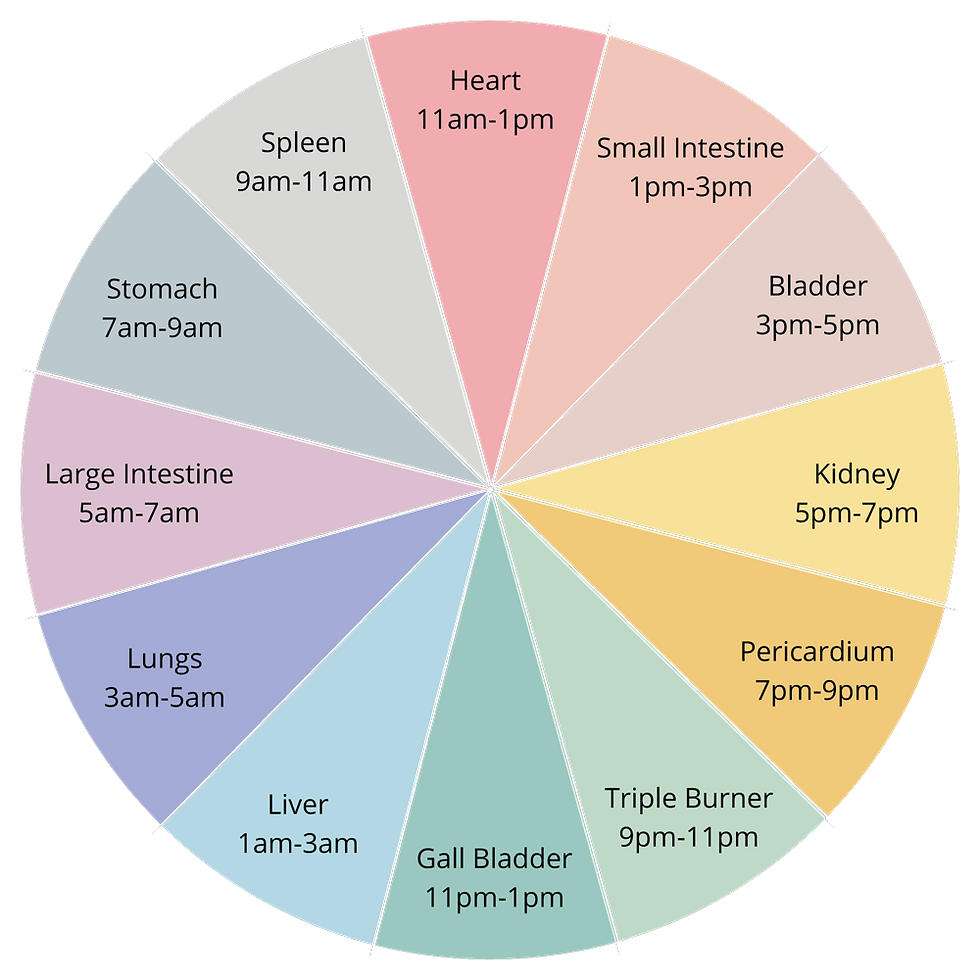Night-Time Waking & What It Can Reveal According to Traditional Chinese Body Organ Clock
- Dec 4, 2019
- 4 min read
Updated: Mar 5, 2025
Waking up in the middle of the night is no big deal if it happens occasionally. But what if you find yourself waking at a certain time every night? Could our bodies be trying to show us something about what is going on internally?
Our body is continuously trying to speak to us through symptoms. When we can slow down and begin to explore what the symptom may be trying to tell us is when we can become in-sync with your body.
Chinese medical texts dating back to the 13th century observed circadian rhythms far before Western medicine. The main difference is its premise that our internal energy (called chi or qi) moves throughout various points of the body at different times during the 24-hour circadian cycle.
Disruption of internal energy at any point during the circadian cycle can manifest into emotional, mental, or physical health problems. This is a potential health issue, as each system within our body must possess the ability to recover and regenerate.
In this blog, we focus on circadian theories as proposed by Chinese medicine. More specifically, the Traditional Chinese Organ Body Clock. We’ll discuss a few abnormal sleep patterns, along with the rationale for each.
Night-Time Waking
If you find you wake up at the same time or same general time-line every night; your body may be trying to tell you something. I love being able to hone in and listen to our body symptoms as often we can gain great insight to how we can bring in support. Let's review some of key wake times and explore what may be gained from the TCM (Traditional Chinese Medicine) perspective.

1. Problems fall asleep between 9-11pm
During this two hour window, arteries and blood vessels are highly active. Problems with either arteries or blood vessels can indicate a myriad of health issues and challenges with adrenal glands, metabolic function, immune system, or thyroid could be the underlying cause.
Psychologically: elevated stress levels, confusion, or racing mind may also prevent you from falling asleep.
Solutions include: meditation, deep breathing, or some other type of relaxation exercise.
Nourishing Tip: Try a warm epsom salt bath with lavender essential oil before bed or try one of our suggested moon milk recipes. Vagal nerve stimulation can also be helpful.
2. Waking between 11pm-1pm
The gallbladder is most active at night; especially during this two-hour window. Between 11 PM and 1 AM, the gallbladder is actively breaking down any fats consumed during the day.
Psychologically: judgmental feelings towards self or others; a sense of resentment; and a lingering inability to forgive someone can trigger wakefulness during this time.
Solutions include: a leaner diet, meditation, and the practice of acceptance and forgiveness – of both yourself and others.
Nourishing Tip: Take digestive bitters with your meals in the day.
3. Waking between 1am-3am
Between the hours of 1 and 3 AM, the liver is busy flushing out any harmful toxins. Certain medications can also force the liver into overdrive, making it difficult to stay asleep. Nutrition and dietary habits are imperative as well.
Psychologically: some say that this time correlates with underlying feelings of anger and guilt. When our mind and body experience the sensations that anger and guilt produce, it is very hard to stay asleep.
Solutions include: a healthier diet (get rid of excess fats and simple carbs); reduce alcohol consumption, especially before bedtime, and practice being mindful. Support liver nutrition and lower toxicant exposures.
Nourishing Tip: Add liver support supplements into your daily routine and maybe try intermittent fasting a few times a week, if you do not have blood sugar issues. Explore our 3-week Ditch & Switch guide to lower your everyday toxicant load.
4. Waking Between 3am-5am
The lungs are busy distributing oxygen to other systems in preparation for the day ahead. Like the liver, the lungs are also working to expel any accumulated toxins. Individuals with lung problems are susceptible to coughing and wheezing during this window.
Psychologically: feelings that may be involved include melancholy and grief. Depressive symptoms can also be triggered during this period.
Solutions include: a healthier diet (consuming foods that promote lung health); quitting smoking, and finding a healthy outlet for any underlying feelings of grief, sadness or depression.
Nourishing Tip: Create a daily ritual of deep breathing using the 4-7-8 technique.
5. Waking between 5am-7am
Between the hours of 5 and 7 in the morning, our intestines are in cleaning mode. Ever wonder why you head to the toilet first thing upon waking up? It is during this window of time that our minds are transitioning to work mode.
Psychologically: thoughts or feelings about one’s lack of progress, or anxiety about the upcoming work day can trigger wakeful impulses.
Solutions include: making sure that you’re drinking plenty of water, as this helps with intestinal cleansing. Make sure your nutritional priorities are in order, as well. As for the negative thoughts, practicing moment-to-moment mindfulness and gratefulness will help ease some of these worries.
Nourishing Tip: Eating a diet high in fiber and probiotics can help assist your body in its cleansing mode
If you need support getting your sleep back on track, reach out to us as this is one of our specialties!
Resource:
Have A Nourishing Day!
Resource: www.powerofpositivity.com





